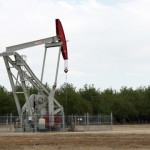 Energy
Energy

QUEST
Should Fracking Be Banned?
From KQED Education Do Now: On Tuesday, November 4, 2014 three counties in California will decide by ballot whether or not to ban hydraulic fracturing, otherwise known as “fracking.” It’s steeped in controversy, from the amount of water it uses to how and where that water--and added chemicals--are eventually disposed. Should fracking be banned? Why or why not?

KQED Science
Activists Push for Public Review of Diablo Canyon Nuclear Power Plant
An environmental group claims there are unanswered questions about the seismic safety of the Central Coast plant.

KQED News
Wanted: Wind Turbine Mechanic — Must Be Daredevil, Skilled With Hands
Copyright 2014 NPR. To see more, visit http://www.npr.org/. ...Read More

KQED News
Long After Fracking Stops, The Noise Lives On
Copyright 2014 NPR. To see more, visit http://www.npr.org/. ...Read More

KQED News
Despite New Sources, Europe Still Relies On Russian Oil
Copyright 2014 NPR. To see more, visit http://www.npr.org/. ...Read More

KQED Science
With Drought, New Scrutiny Over Fracking’s Water Use
The drought is putting a spotlight on water use around California, including for hydraulic fracturing. How much water does fracking use and will it increase as companies tap into the Monterey Shale, estimated to be the largest oil resource in country?

KQED Science
Anti-Fracking Activists in California Take Fight to County Ballots
Activists are hoping local residents will do what state legislators haven’t done -- shut down the controversial oil production technique known as hydraulic fracturing.

QUEST
Are Consumers or Corporations Responsible for Reducing Carbon Emissions?
Source: DoNow Science Tags: featured, full-image ...Read More

KQED News
Jerry Brown on Carbon’s ‘Dark Shadow of Toxicity’ at Climate Summit
Gov. Jerry Brown (Jim Watson/AFP/Getty Images) Speaking at the U.N. Climate Summit in New York Tuesday, Gov. Jerry Brown said California is ahead of the pack when it comes to lowering greenhouse gases. At the U.N. Private Sector Forum, Brown cited laws requiring more alternative energy sources, more electric vehicles and better ...Read More

KQED Science
Are Consumers or Corporations Responsible for Reducing Carbon Emissions?
From KQED Education Do Now: Climate change has been on the minds of a lot of people with the release of the IPCC Fifth Assessment Report and the third National Climate Assessment. Who is responsible for curtailing carbon emissions?

KQED Science
Two New Studies Underline How Methane Matters to Global Carbon Cycle
Natural gas is often called a "bridge fuel" that will help ease us off of carbon-based energy. But a study suggests that without policies to push us toward renewables and away from fossil fuels, natural gas will still leave the sky as a waste dump.

KQED Science
Oil Transport by Train Continues to Climb
Sixty-six percent more oil came into California by rail in the first half of this year, compared to the first half of last year.

KQED Science
Richmond Approves Contentious Chevron Project
Richmond's city council has given the green light to a controversial refinery project. Chevron's $1 billion upgrade at its Richmond refinery will allow it to refine higher-sulfur crude oil.

KQED Science
Feds Propose New Safety Rules for Oil Trains
There have been several fiery oil train derailments in other parts of the country in the past year. The new rules include lower speed limits, better brakes and safer rail cars.

KQED Science
Richmond Nearly Ready to Approve Chevron Refinery Project
The Richmond City Council is considering Chevron's plans for a $1 billion project at its refinery there. If it's approved, this is one of the last steps before construction on the project would actually begin.

KQED Science
California Has Little Say Over Oil Train Safety
The state can't set speed limits on trains. It can't tell railroads to choose less hazardous routes. It can't tell oil companies not to bring trains carrying volatile crude through cities.

KQED Science
California’s New Fracking Regulations Delayed Half a Year
State lawmakers approved the delay in late June, and at the same time tightened up the environmental review process for fracking permits.

KQED Science
Benicia Extends Public Comment Period on Bay Area Crude-by-Rail
Benicia city officials are giving people more time to comment on a proposal to bring crude oil by rail to Valero’s refinery there.

KQED Science
Oklahoma Study Offers Better Insight into Industrial Earthquakes
A new study adds strong evidence that deep-injection wells can occasionally nudge a fault into activity. The key is figuring out how it happens, then learning to avoid whatever is making it happen.

KQED Science
Supreme Court Won’t Hear Dispute Over California Fuel Standard
The justices on Monday turned away appeals from fuel makers that say the law discriminates against out-of-state producers.






